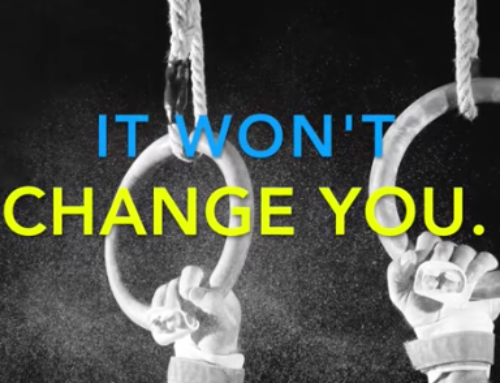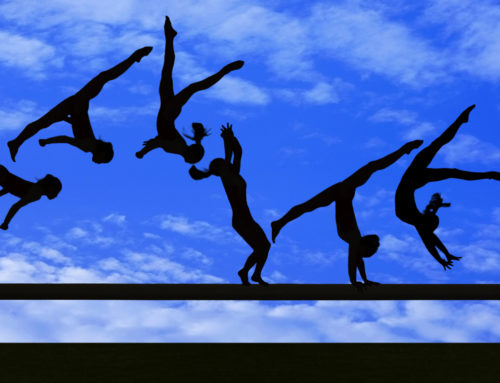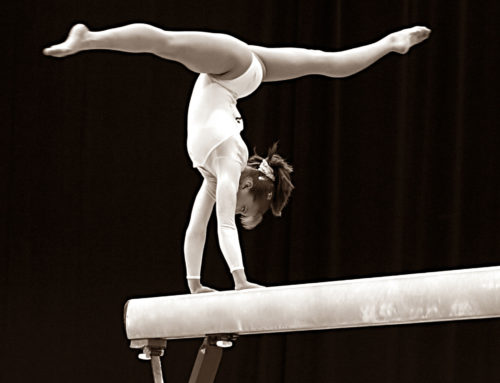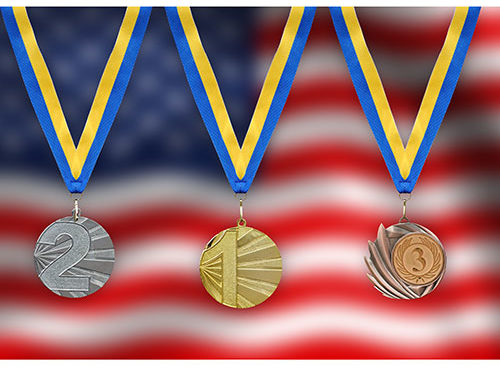Do you love or despise the Grind? According to Dr. Jim Taylor, the Grind is the point in your athletic training when things get tiring, painful and tedious. I struggled with this very thing as a gymnast. I got to a point where I realized my motivation was gone, and the grind had gotten the best of me.
The Grind will eliminate those who truly don’t want it bad enough. Those who embrace it are much more likely to accomplish their athletic goals.
Dr. Taylor suggests you should neither love nor hate the grind, just accept it as part of the deal towards accomplishing your goals. The Grind may not be very enjoyable, but what does feel good is seeing your hard work pay off with success.
Enjoy! Brad Thornton
Sports: What Motivates Athletes?
by Jim Taylor, Ph.d
When I speak to groups of young athletes, I always ask how many have big goals, like going to the Olympics or playing pro ball. About 90% raise their hands. I then ask how many are doing everything they can to achieve their goals. Only one or two tentative hands go up. What this tells me is that there is often a big gap between the goals athletes have and the effort they are putting into those goals.
It’s easy to say that you want to be a successful athlete. It is much more difficult to actually make it happen. If you have this kind of disconnect, you have two choices.
You can either lower goals to match your effort or you can raise your effort to match your goals. There is no right answer. But if you’re truly motivated to be successful, you better make sure you’re doing the work necessary to achieve your goals.
Signs of Low Motivation
There are several signs of low motivation:
- A lack of desire to practice as much as you should.
- Less than 100% effort in training.
- Skipping or shortening training.
- Effort that is inconsistent with your goals.
Prime motivation means putting 100% of your time, effort, energy, and focus into all aspects of your sport. It involves doing everything possible to become the best athlete you can be.
Prime motivation begins with what I call the three D’s.
The first D stands for direction.
Before you can attain prime motivation, you must first consider the different directions you can go in your sport.
You have three choices: stop participating completely, continue at your current level, or strive to be the best athlete you can be.
The second D represents decision.
With these three choices of direction, you must select one direction in which to go. None of these directions are necessarily right or wrong, better or worse, they’re simply your options. Your choice will dictate the amount of time and effort you will put into your sport and how good an athlete you will ultimately become.
The third D stands for dedication.
Once you’ve made your decision, you must dedicate yourself to it. If your decision is to become the best athlete you can be, then this last step, dedication, will determine whether you have prime motivation. Your decision to be your best and your dedication to your sport must be a top priority. Only by being completely dedicated to your direction and decision will you ensure that you have prime motivation.
Developing Prime Motivation
Focus on your long-term goals.
To be your best, you have to put a lot of time and effort into your sport. But, as I noted above, there are going to be times-the Grind-when you don’t feel that motivated.
When you feel this way, focus on your long-term goals. Remind yourself why you’re working so hard. Imagine exactly what you want to accomplish and tell yourself that the only way you’ll be able to reach your goals is to continue to work hard.
Try to generate the feelings of inspiration and pride that you will experience when you reach your goals. This technique will distract you from the discomfort of the Grind, focus you on what you want to achieve, and generate positive thoughts and emotions that will get you through the Grind.
Have a training partner.
It’s difficult to be highly motivated all of the time on your own. There are going to be some days when you just don’t feel like getting out there. Also, no matter how hard you push yourself, you will work that much harder if you have someone pushing you. That someone can be a coach, personal trainer, or parent. But the best person to have is a regular training partner, someone at about your level of ability and with similar goals. You can work together to accomplish your goals. The chances are on any given day that one of you will be motivated. Even if you’re not very psyched to practice on a particular day, you will still put in the time and effort because your partner is counting on you.
Focus on greatest competitor.
Another way to keep yourself motivated is to focus on your greatest competitor. Identify who your biggest competition is and put his or her name or photo where you can see it every day. Ask yourself, “Am I working as hard as him/her?” Remember that only by working your hardest will you have a chance to overcome your greatest competitor.
Motivational cues.
A big part of staying motivated involves generating positive emotions associated with your efforts and achieving your goals.
A way to keep those feelings is with motivational cues such as inspirational phrases and photographs. If you come across a quote or a picture that moves you, place it where you can see it regularly such as in your bedroom, on your refrigerator door, or in your locker.
Look at it periodically and allow yourself to experience the emotions it creates in you. These reminders and the emotions associated with them will inspire and motivate you to continue to work hard toward your goals.
Set goals.
There are few things more rewarding and motivating than setting a goal, putting effort toward the goal, and achieving the goal. The sense of accomplishment and validation of the effort makes you feel good and motivates you to strive higher. It’s valuable to establish clear goals of what you want to accomplish in your sport and how you will achieve those goals. Seeing that your hard work leads to progress and results should motivate you further to realize your goals.
Daily questions.
Every day, you should ask yourself two questions. When you get up in the morning, ask, “What can I do today to become the best athlete I can be?” and before you go to sleep, ask, “Did I do everything possible today to become the best athlete I can be?” These two questions will remind you daily of what your goals are and will challenge you to be motivated to become your best.
The heart of motivation.
A final point about motivation. The techniques I’ve just described are effective in increasing your short-term motivation. Motivation, though, is not something that can be given to you. Rather, motivation must ultimately come from within. You must simply want to participate in your sport. You just have to want it really bad.






Leave A Comment